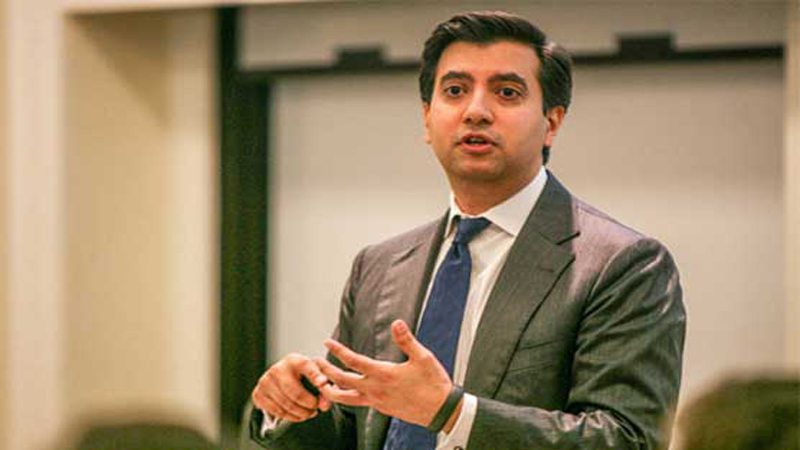News Analysis |
Newly appointed Pakistani Ambassador to the USA; Ali Jahangir Siddiqui expressed Pakistan’s intentions of working towards peace in Afghanistan. In a meeting with US President Donald Trump last month the Ambassador presented Pakistan’s manifesto for improving commercial and security bilateral relations.
Speaking to Bloomberg last weekend Siddiqui outlined Pakistan’s historical alliance with past US administrations and welcomed US investment in Pakistan’s growing market. The vortex of US-Pakistan agenda is the situation in Afghanistan and the Ambassador stressed the need for regional peace to maximize foreign investment opportunities.
In the past 5 years, Pakistan’s crime and terrorism statistics have gone down by 80 percent creating more room for development in industrial manufacturing, telecommunications and mainly the energy sector. The Pakistani envoy’s manifesto suggested the importing of more liquefied natural gas (LNG) from the US as the key to enhancing his nation’s energy supply while expanding trade relations.
The ambassador however denounced such hostilities and affirmed the possibility and promise of multilateralism. If Pakistan does not view US-India relations in a certain light then Sino-Pak relations should also not be considered through a similar lens, he said.
Buying more LNG from the US will improve bilateral relations while contextualizing the Afghani peace process. Being the largest exporter of LNG, and Pakistan being one of the top importers of LNG will build upon the “fairness” and “parity” that Pakistan and the Trump administration both seek.
“Pakistan is on its way to becoming one of the world’s largest gas importers, and the U.S. is well on its way to becoming the world’s largest LNG exporter,” Siddiqui added.
Siddiqui mentioned US energy giant Exxon Mobil Corp. and its proposed plans to begin large scale building of an offshore LNG import terminal. Exchange of technology and resources to supplement the chemical manufacturing process is also underway to be completed within 6 to 12 months.
Read more: Peaceful Afghanistan is in Pakistan’s best interest: General Zubair
The U.S. is now a net gas exporter for the first time since the 1950s, thanks to cargoes from new terminals in Louisiana and Maryland and deliveries via pipeline to Mexico. America’s bounty of shale gas has reached buyers from Latin America to China.
Siddiqui, who took his oath as ambassador in April, talked about Pakistan’s energy crisis and the detrimental effects on its economy namely on its prime export of textiles. Over the course of 2 years, better energy solutions could improve Pakistan‘s output ranging from agriculture to software, he said, while maintaining the balance of bilateral trade.
In the past decade, bilateral trade between the two countries has halted at around $5.5 billion in goods per annum. Top U.S. exports to Pakistan include machinery and aircraft, while imports are usually leather goods and textiles.
The economic imbalance in Pakistan comes as result of depleted foreign reserves and widening debt as well as trade deficits signaling a dire need for structural overhaul. Despite Pakistan’s commitment to peace in Afghanistan, says Siddiqui, the US continues to sideline Pakistan on foreign policy for failing to crack down on terrorist safe havens it claims are situated within its territory.
The Pakistani envoy’s manifesto suggested the importing of more liquefied natural gas (LNG) from the US as the key to enhancing his nation’s energy supply while expanding trade relations.
Lieutenant General Austin Miller who was nominated by Trump to lead coalition forces in Afghanistan, testified to a Senate panel about the countless sacrifices exhibited by the Army and inhabitants of Pakistan. Nonetheless, he added “we have not yet seen these counter-terrorism efforts against anti-Pakistan militants translate into definitive actions against Afghan Taliban or Haqqani leaders residing in Pakistan.”
Read more: Cross Border Incursions and Afghanistan’s Audacity
The Pakistani envoy also answered questions relating to the Financial Action Task Force (FATF)’s grey list upon which Pakistan was reinterred after a brief exit, disagreeing with the impact it might have. Pakistan was placed once again on the grey list under accusations of financing terrorism in effort to wrest away Islamabad’s financing power through such technicalities.
Despite Pakistan’s commitment to peace in Afghanistan, says Siddiqui, the US continues to sideline Pakistan on foreign policy for failing to crack down on terrorist safe havens it claims are situated within its territory.
Pakistan’s ongoing attempts to fence off its western border with Afghanistan displays its earnestness in combatting cross border terrorism. In a world of proxy wars, it makes little sense for far more powerful countries already embroiled in overseas conflict to police a struggling nation still undergoing existential threats. The fence will be mostly covering inhospitable terrain but not affecting commercial prospects with Kabul which seeks to tap into the burgeoning trade provided by the Pak-China corridor.
Read more: Pulling the plug on Afghanistan
Sino-Pak ties unveil another facet of cooler US foreign policy towards Pakistan. Pakistan has enjoyed long term cordial relations with China, says Siddiqui. With China’s OBOR policy providing a breakaway from Western styled approach to trade and security, there are apprehensions in Washington as to the implications it has on regional peace in Afghanistan. The ambassador, however, denounced such hostilities and affirmed the possibility and promise of multilateralism. If Pakistan does not view US-India relations in a certain light then Sino-Pak relations should also not be considered through a similar lens, he said.













